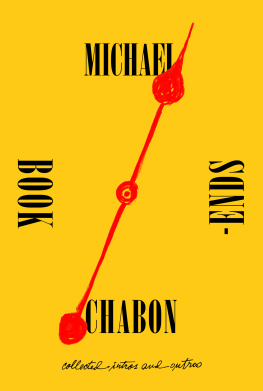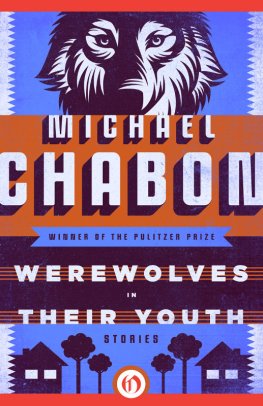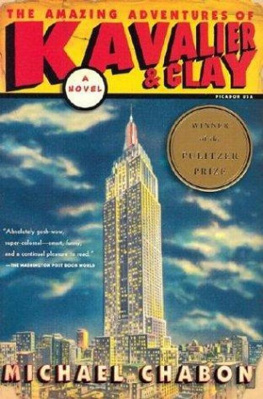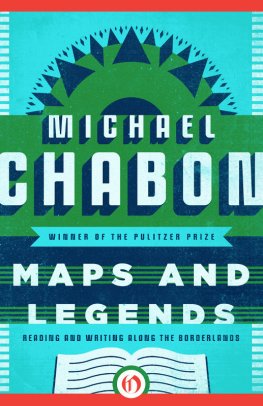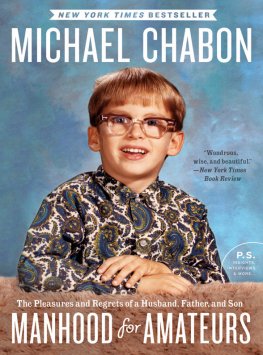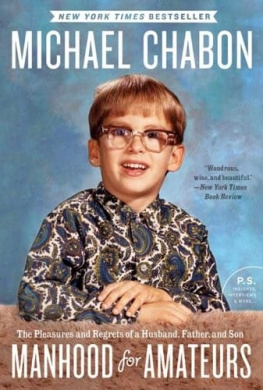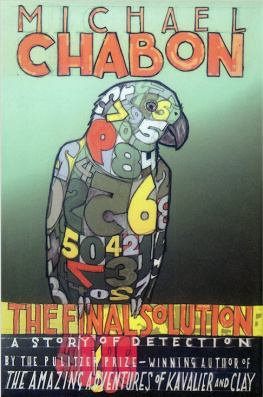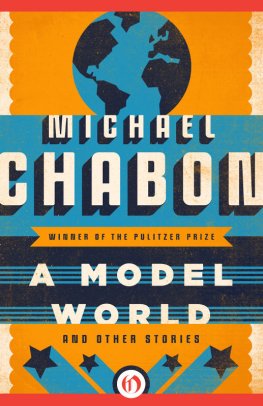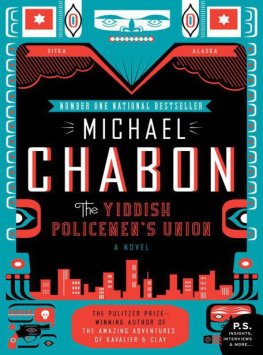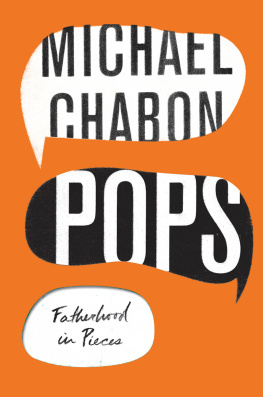Michael Chabon - Bookends
Here you can read online Michael Chabon - Bookends full text of the book (entire story) in english for free. Download pdf and epub, get meaning, cover and reviews about this ebook. year: 2018, publisher: HarperCollins, genre: Art. Description of the work, (preface) as well as reviews are available. Best literature library LitArk.com created for fans of good reading and offers a wide selection of genres:
Romance novel
Science fiction
Adventure
Detective
Science
History
Home and family
Prose
Art
Politics
Computer
Non-fiction
Religion
Business
Children
Humor
Choose a favorite category and find really read worthwhile books. Enjoy immersion in the world of imagination, feel the emotions of the characters or learn something new for yourself, make an fascinating discovery.
- Book:Bookends
- Author:
- Publisher:HarperCollins
- Genre:
- Year:2018
- Rating:5 / 5
- Favourites:Add to favourites
- Your mark:
- 100
- 1
- 2
- 3
- 4
- 5
Bookends: summary, description and annotation
We offer to read an annotation, description, summary or preface (depends on what the author of the book "Bookends" wrote himself). If you haven't found the necessary information about the book — write in the comments, we will try to find it.
Bookends — read online for free the complete book (whole text) full work
Below is the text of the book, divided by pages. System saving the place of the last page read, allows you to conveniently read the book "Bookends" online for free, without having to search again every time where you left off. Put a bookmark, and you can go to the page where you finished reading at any time.
Font size:
Interval:
Bookmark:
To Jennifer Barth
I remind you that all things are but a beginning, forever beginning.
S T . A LIA OF THE K NIFE
I NEVER READ INTRODUCTIONS, SAYS R OSE, THE YOUNGER OF my two daughters. She thinks it over for a second, frowns; the statement doesnt quite ring true. She emends it: Well, Ive read two, she says. One turns out to be Jack Kerouacs introduction to Robert Franks The Americans, required reading for a photography class: But it was fine because I like his style. The other is Sherman Alexies introduction to his own The Lone Ranger and Tonto Fistfight in Heaven (a favorite book, and author, of Roses), because it felt like it would be rude not to.
I suspect that my daughters antipathy toward introductions (we did not discuss postscripts) is fairly common among avid readers. People who never bother to read what is more properly styled a foreword (in which one writer presents the work of another) or a preface (in which the writer herself, often retrospectively, reflects on her own work) are likely as numerous as people who dont bother with user manuals before launching the software application or powering up the widget.
You will not find me among either group; in the first instance out of hard experience but in the second out of love, pure love, from the time of my first encounter, circa 1979, with John Cheevers all-too-brief preface to his Stories, which contains the following passage, in which I now detect a premonitory stirring, two decades ahead of schedule, of The Amazing Adventures of Kavalier & Clay:
These stories seem at times to be stories of a long-lost world when the city of New York was still filled with a river light, when you heard the Benny Goodman quartets from a radio in the corner stationery store, and when almost everybody wore a hat.
Certain forewordsSusan Sontags to The Barthes Reader, Walter Benjamins to Fables of Leskovand prefacesRaymond Chandlers to The Simple Art of Murder, Robert Townes to the published script of Chinatown, Elmore Leonards to his Complete Western Storieshave become beloved, even crucial texts for me, to be regularly re-readas are Nabokovs afterword to Lolita and Leigh Bracketts to her Best of collection.
Some forewords are transitive: acts of seduction that are at the same time documents of earlier seductions. I already had a serious literary crush on Susan Sontag when I saw her name on the cover of The Barthes Reader and plunged into her foreword, at which point I discovered that Sontag, in turn, had a serious literary crush on this droll-looking Frenchman in his ubiquitous cardigan; I emerged from her foreword with a crush of my own on the late M. Barthes. Other forewords are parasitical; like cuckoos eggs laid in crows nests they hatch and flourish at the expense of their hosts. The fables of Nikolai Leskov are fine, if you like that sort of thing, but I cant imagine life without The Storyteller, Benjamins preface to a German translation of that Russian classic. Benjamins diamantine epigrammatic style is on dazzling display throughout the piece but in no other writing of his does it do the work of heartbreak so powerfully as toward the end of the first section of The Storyteller, where Benjamin collapses all the industrialized brutality and disruption of the First World War into some fifty words:
A generation that had gone to school on a horse-drawn streetcar now stood under the open sky in a countryside in which nothing remained unchanged but the clouds, and beneath these clouds, in a field of force of destructive torrents and explosions, was the tiny, fragile human body.
But Benjamins cuckoos egg also had a lasting, personal effect on me, far more acute than anything I got from the Fables it nominally served to introduce. I used to worry, sometimesin particular after I read Frank OConnors seminal meditation on the short story, The Lonely Voicethat unlike James Joyce, Anton Chekhov, A. E. Coppard, and the other writers Frank OConnor lionized in The Lonely Voice, I was not really from anywhere. My family had been on the move for three generations or more, on both sides, and by the age of twenty-five I had lived in more than a dozen different places. The distinction Benjamin draws, in his foreword to Leskov, between storytellers who stay put and accumulate stockpiles of local lore and those who travel the world collecting the material of the tales they bring home, went a long way to reassuring me that my rootlessness was not only a legitimate condition for writing but, potentially, a theme worth exploring in my work.
As for prefaces (and afterwords), these may be explanatory, apologetic, triumphal, tendentious, rueful, score-settling, spiteful, bibliographic, theoretical (as is the case with Chandlers), or gently embarrassed (as is the case with Cheevers) but the best of themlike Cheeversare also what I would call restorative. They unstopper the vial that contains, like some volatile oil, the fragrance of the time in which the prefaced work was engendered, conceived, or written, summoning for writer and reader alike a sensuous jolt of things past: Cheevers Goodman-haunted stationery stores; the motels and dusty mountainsides of Nabokovs midcentury transcontinental butterfly hunt; Townes ache for the smell of orange groves and all the lost Los Angeles that it encodes; and the Malibu, desolate and wild as Barsoom, of Leigh Bracketts girlhood.
There are many reasons a writer might agree to provide an introduction to her own or another writers book: affection, gratitude, regret, revenge, enthusiasm, a desire to evangelize or set the record straight. Ive done it for some of those reasons, and more. But the primary motivation for writing introductions has been the same as for everything I write: a hope of bringing pleasure to the readerto some reader, somewhere. In this hope my sole assurance has been the pleasure Ive taken as a reader, over the years, in the prefaces, forewords, and afterwordsthe intros and outroswritten by others. Im aware that this assurance may be far from sufficient for many readers, however, and I would encourage skippers of introductions to put this book down and seek pleasure elsewherebut what would be the point?
T HE WORLD IS SO BIG, SO COMPLICATED, SO REPLETE WITH marvels and surprises that it takes years for most people to begin to notice that it is, also, irretrievably broken. We call this period of research childhood.
There follows a program of renewed inquiry, often involuntary, into the nature and effects of mortality, entropy, heartbreak, violence, failure, cowardice, duplicity, cruelty, and grief; the researcher learns their histories, and their bitter lessons, by heart. Along the way, he or she discovers that the world has been broken for as long as anyone can remember, and struggles to reconcile this fact with the ache of cosmic nostalgia that arises, from time to time, in the researchers heart: an intimation of vanished glory, of lost wholeness, a memory of the world unbroken. We call the moment at which this ache first arises adolescence. The feeling haunts people all their lives.
Everyone, sooner or later, gets a thorough schooling in brokenness. The question becomes: what to do with the pieces? Some people hunker down atop the local pile of ruins and make do, Bedouins tending their goats in the shade of shattered giants. Others set about breaking what remains of the world into bits ever smaller and more jagged, kicking through the rubble like kids running through piles of leaves. And some people, passing among the scattered pieces of that great overturned jigsaw puzzle, start to pick up a piece here, a piece there, with a vague yet irresistible notion that perhaps something might be done about putting the thing back together again.
Font size:
Interval:
Bookmark:
Similar books «Bookends»
Look at similar books to Bookends. We have selected literature similar in name and meaning in the hope of providing readers with more options to find new, interesting, not yet read works.
Discussion, reviews of the book Bookends and just readers' own opinions. Leave your comments, write what you think about the work, its meaning or the main characters. Specify what exactly you liked and what you didn't like, and why you think so.

